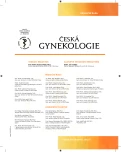Mental changes in women due to the use of hormonal contraception
Authors:
B. Ottová 1,2; P. Weiss 1,3
Authors‘ workplace:
Katedra psychologie, Filozofická fakulta UK, Praha, vedoucí pracoviště doc. PhDr. I. Gillernová, CSc.
1; Ústřední lékařsko-psychologické oddělení, Ústřední vojenská nemocnice – Vojenská fakultní nemocnice, Praha, vedoucí pracoviště plk. PhDr. J. Klose, Ph. D.
2; Sexuologický ústav, 1. LF UK a VFN, Praha, přednosta doc. MUDr. M. Pohanka, Ph. D.
3
Published in:
Ceska Gynekol 2015; 80(5): 355-359
Overview
The study investigates physical, mental and sexual changes in women at the beginning of use or after discontinuation of a combined hormonal contraception. Thirty women were interviewed at least 3 months and at most 2 years after the start of use or discontinuation of combined hormonal contraception. Semi-structured interviews were supplemented by 16-symptom rating scale on which women assessed the results of an imaginary study of side effects of hormonal contraception. Both methods identically demonstrated pronounced effect of combined hormonal contraception on decline in sexual desire and painful menstruation. No clear difference was found in psychical symptoms, although qualitative analysis indicated possible changes.
Keywords:
combined hormonal contraception, menstrual cycle, sexual desire, mental changes, premenstrual syndrome, side effects
Sources
1. Bachmann, GA., Bancroft, J., Braunstein, G., et al. Female androgen insufficiency: The Princeton Consensus Statement on definition, classification and assessment. Fertil Steril, 2002, 77, 4, p. 660–665.
2. Bancroft, J., Sherwin, BB., Alexander, GM., et al. Oral contraceptives, androgens, and the sexuality of young women: I. A comparison of sexual experience, sexual attitudes, and gender role in oral contraceptive users and nonusers. Arch Sex Behav, 1991, 20, 2, p. 105–120.
3. Bendek, T., Rubinstein, B. The sexual cycle in women. Washington, DC, National Research Council, 1942.
4. Boyle, GJ., Grant, AF. Prospective versus retrospective assessment of Menstrual cycle symptoms and moods: Role of Attitudes and beliefs. J Psychopathol Behavioral Ass, 1992, 14, 4, p. 307–321.
5. Caruso, S., Agnello, C., Intelisano, G., et al. Sexual behavior of women taking low-dose oral contraceptive containing 15 µg ethinylestradiol/60 µg gestodene. Contraception, 2004, 69, 3, p. 237–240.
6. Caruso, S., Agnello, C., Intelisano, G., et al. Prospective study on sexual behavior of women using 30 µg ethinylestradiol and 3 mg drospirenone oral contraceptive. Contraception, 2005, 72, 1, p. 19–23.
7. Čepický, P. Antikoncepce, intercepce, sterilizace. In Roztočil, A. Moderní gynekologie. 1. vyd. Praha: Grada, 2011, s. 105–115. ISBN 9788024728322.
8. Fait, T. Antikoncepce: průvodce ošetřujícího lékaře. Praha: Maxdorf, 2008, 103 s. Farmakoterapie pro praxi, sv. 34. ISBN 978-807-3451-721.
9. Frank, RT. The hormonal causes of premenstrual tension. Arch Neur Psych, 1931, 26, 5, p. 1053–1057.
10. Graham, CA., Sherwin, BB. The relationship between mood and sexuality in women using an oral contraceptive as a treatment for premenstrual symptoms. Psychoneuroendocrinology, 1993, 18, 4, p. 273–281.
11. Graham, CA., Ramos, R., Bancroft, J., et al. The effects of steroidal contraceptives on the well-being and sexuality of women: a double-blind, placebo-controlled, two-centre study of combined and progestogen-only methods. Contraception, 1995, 52, 6, p. 363–369.
12. Oinonen, KA., Mazmanian, D. To what extent do oral contraceptives influence mood and affect? J Affective Dis, 2002, 70, 3, p. 229–240.
13. Pastor, Z., Holla, K., Chmel, R. The influence of combined oral contraceptives on female sexual desire: A systematic review. Eur J Contracepti Reprod Health Care, 2013, 18, 1, p. 27–43.
14. Rivera-Woll, LM., Papalia, M., Davis, SR., et al. Androgen insufficiency in women: diagnostic and therapeutic implications. Hum Reprod Update, 2004, 10, 5, p. 421–432.
15. Ross, C., Coleman, G., Stojanovska, C. Prospectively reported symptom change across the menstrual cycle in users and non-users of oral contraceptives. J Psychosom Obstet Gynaecol, 2003, 24, 1, p. 15–29.
16. Sanders, SA., Graham, CA., Bass, JL., et al. A prospective study of the effects of oral contraceptives on sexuality and well-being and their relationship to discontinuation. Contraception, 2001, 64, 1, p. 51–58.
17. Sveindóttir, H., Bäckström, T. Prevalence of menstrual cycle symptom cyclicity and premenstrual dysphoric disorder in a random sample of women using and not using oral contraceptives. Acta Obstet Gynecol Scand, 2000, 79, 5, p. 405–413.
18. Weiss, P. Sexuální chování české populace. In Šulová, L., Fait, T., Weiss, P. Výchova k sexuálně reprodukčnímu zdraví. Praha: Maxdorf, 2011, s. 147–154. ISBN 9788073452384.
Labels
Paediatric gynaecology Gynaecology and obstetrics Reproduction medicineArticle was published in
Czech Gynaecology

2015 Issue 5
-
All articles in this issue
- Robot assisted endometrial cancer staging – evaluation the first 100 operations and comparing the first andthe last 30 operations
- Diaphragmatic surgery in advanced ovarian cancer therapy
- Radical fertility preserving surgery of gynaecological malignancies – five-year-old file
- Efficacy of surgical treatment of stress urinary incontinence with mini-invasive single incision sling
- Correlation of subjective and objective assessment of vaginal prolapse surgery – secondary analysis of randomized controlled study in patients with pelvic floor injury treated with vaginal mesh or with sacrospinous ligament fixation
- Mental changes in women due to the use of hormonal contraception
- Histological types of uterine fibroids in reproductive age and postmenopausal women
- Robotic sacrocolpopexy – two case reports and literature overview
- Heterotopic pregnancy after spontaneous conception
- Caesarean scar pregnancy – case report
- Delivery modes and the neonatal outcomes of low birth-weight neonates in a Brazilian reference health center
- Czech Gynaecology
- Journal archive
- Current issue
- About the journal
Most read in this issue
- Mental changes in women due to the use of hormonal contraception
- Histological types of uterine fibroids in reproductive age and postmenopausal women
- Heterotopic pregnancy after spontaneous conception
- Diaphragmatic surgery in advanced ovarian cancer therapy
